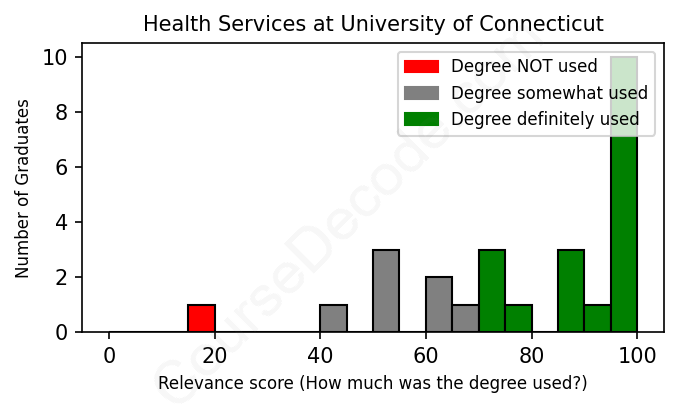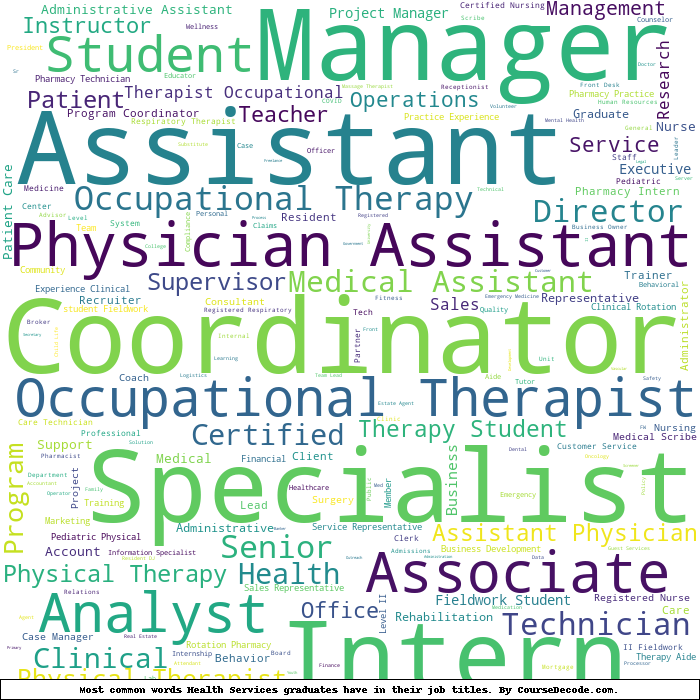
First, some facts. Of the Health Services graduates from University of Connecticut we've analyzed , here's how many have used (or NOT used) their degree in their career:

These are estimates based on AI analysis of 26 LinkedIn profiles (see below).
The verdict? Significantly above average. Overall, with an average relevance score of 78%, Health Services graduates from University of Connecticut have a much higher likelihood (+11%) of finding work in this field compared to the average graduate across all fields:
And for comparison, here's the chart for all profiles we've looked at across all degrees.
Also, after graduating, 65% of these graduates have pursued further education other than another Bachelor's degree (such as a Masters degree or other), compared to the average across all profiles of 35%. This suggests you may need more than just a Bachelors degree to be competitive as a Health Services graduate.
See the details:
|
Relevance score: 50% We think this person has gone into a career only somewhat relevant to their degree. We think this person has gone into a career only somewhat relevant to their degree.
DEGREE INFOGraduated in 2023 from University of Connecticut with a Bachelor of Science - BS in Health Services. Also pursued further education since (see below). JOB HISTORY SINCE GRADUATIONAssistant Soccer Coach NORTHEAST UNITED PREMIER SC Jun 2023 - Present FURTHER DEGREES DONE SINCE GRADUATINGGraduate CertificateUniversity of Connecticut 2023 - 2024 ABOUTNo information provided. |
The top 10 most common jobs done by the graduates we've analyzed (ranked most common to least) are:
When looking at the career paths of University of Connecticut graduates who studied Health Services, one thing stands out: many of them have taken jobs that vary widely in their relevance to the field. While some graduates found roles directly applicable to health services, like Surgical Technicians or Registered Nurses, others have ventured into positions that, while related, don't really use their specific training. For instance, jobs such as Administrative Assistants or Project Coordinators may touch on healthcare issues but don’t require the extensive knowledge gained from their degree. So, those who pursued careers in healthcare professions—such as occupational therapy or nursing—are definitely putting their education to good use, while others have drifted toward roles in finance or retail that are light on health services specifics.
Overall, the mix shows that while there are significant opportunities for Health Services graduates in direct patient care and related fields, many end up in positions where their degree doesn't fully align with their work responsibilities. This suggests that while a degree in Health Services provides valuable knowledge and skills, not every career path will utilize that training to its fullest potential. It's a mix of passion and practicality, where some graduates follow their healthcare dreams while others find themselves in roles that, surprisingly, don't rely heavily on their specialized education.
Here is a visual representation of the most common words in job titles for Health Services graduates (this is across all Health Services graduates we've analyzed, not just those who went to University of Connecticut):

From looking at the career paths of graduates from the University of Connecticut with a degree in Health Services, it seems that many of them land jobs related to health care soon after graduation. For those who graduated around 2011 to 2016, many started their careers in roles like surgical technician, patient care coordinator, or various assistant positions in hospitals and rehabilitation centers. Over the next 5 to 10 years, a lot of these folks seem to transition into more specialized roles such as occupational therapists or registered nurses, while others venture into administrative and managerial roles within healthcare organizations. It’s clear that many of them have found good opportunities that build on their education, making use of their knowledge in health services.
On the flip side, there's a noticeable number of graduates who ended up in jobs that aren't directly related to health services, especially those who graduated a bit later, like in 2018 and beyond. Some shifted into roles that feel more corporate or sales-oriented, which might not fully utilize their health services background. However, many still ultimately found their footing within health-related careers, like personal trainers or nursing jobs. Overall, it seems like a solid mix where a good portion of graduates remain in the healthcare field, but there are definitely a few who explore broader career options, which isn't necessarily a negative thing. So, if you're considering a Health Services degree at UConn, know that it opens up a lot of pathways, many of which keep you connected to the health sector!
Honestly, a Bachelor’s degree in Health Services can be a mixed bag in terms of difficulty, and at the University of Connecticut, it tends to be on the more manageable side compared to some other majors. While there are definitely courses that can challenge you—like statistics or health policy—it's often less intense than degrees in science-heavy fields like nursing or pre-med. Plus, the program usually emphasizes practical applications and team projects, which can make the learning experience more engaging and less stressful. If you’re organized and genuinely interested in the subject, you'll likely find it doable, with a good balance of workload and support from your professors.
Most commonly, in the LinkedIn profiles we've looked at, it takes people 4 years to finish a Bachelor degree in Health Services.
So, looking at these UConn grads and their job paths, it kind of seems like they’ve done alright money-wise, especially considering the range of fields in health services. The ones in roles like IT Manager or Physical Therapist are likely bringing in some decent salaries—pretty solid for a grad, I'd say. On the other hand, some of the earlier jobs like Surgical Technician or Patient Care Coordinator might not pay as much initially, but they seem to be moving up in the ranks or shifting into positions with more earning potential, which bodes well for their future. Overall, it appears that while some might have started on the lower end of the pay spectrum, most are climbing up to more lucrative roles, showing that they’re likely to be earning a decent living down the line!
Here is a visual representation of the most common words seen in the "about" section of LinkedIn profiles who have a Bachelor degree in Health Services (this is across all Health Services graduates we've analyzed, not just those who went to University of Connecticut). This may or may not be useful:

Here are all colleges offering a Bachelor degree in Health Services (ordered by the average relevance score of their Health Services graduates, best to worst) where we have analyzed at least 10 of their graduates:
| College | Score | Count |
|---|---|---|
 The Ohio State University The Ohio State University
|
88 | 14 |
 Quinnipiac University Quinnipiac University
|
88 | 10 |
 Grand Valley State University Grand Valley State University
|
87 | 16 |
 University of Tampa University of Tampa
|
87 | 10 |
 Stony Brook University Stony Brook University
|
80 | 15 |
 Boston University Boston University
|
79 | 12 |
 University of Connecticut University of Connecticut
|
78 | 26 |
 Florida Agricultural and Mechanical University Florida Agricultural and Mechanical University
|
76 | 12 |
 Texas A&M University Texas A&M University
|
72 | 16 |
 University of South Florida University of South Florida
|
72 | 26 |
 Boise State University Boise State University
|
71 | 11 |
 University of Central Florida University of Central Florida
|
68 | 47 |
 Florida Gulf Coast University Florida Gulf Coast University
|
68 | 10 |
 James Madison University James Madison University
|
66 | 26 |
 University of Missouri-Columbia University of Missouri-Columbia
|
66 | 17 |
 California State University, Fullerton California State University, Fullerton
|
66 | 13 |
 California State University - East Bay California State University - East Bay
|
66 | 10 |
 Arizona State University Arizona State University
|
62 | 10 |
 Cleveland State University Cleveland State University
|
60 | 10 |
 Stockton University Stockton University
|
58 | 12 |